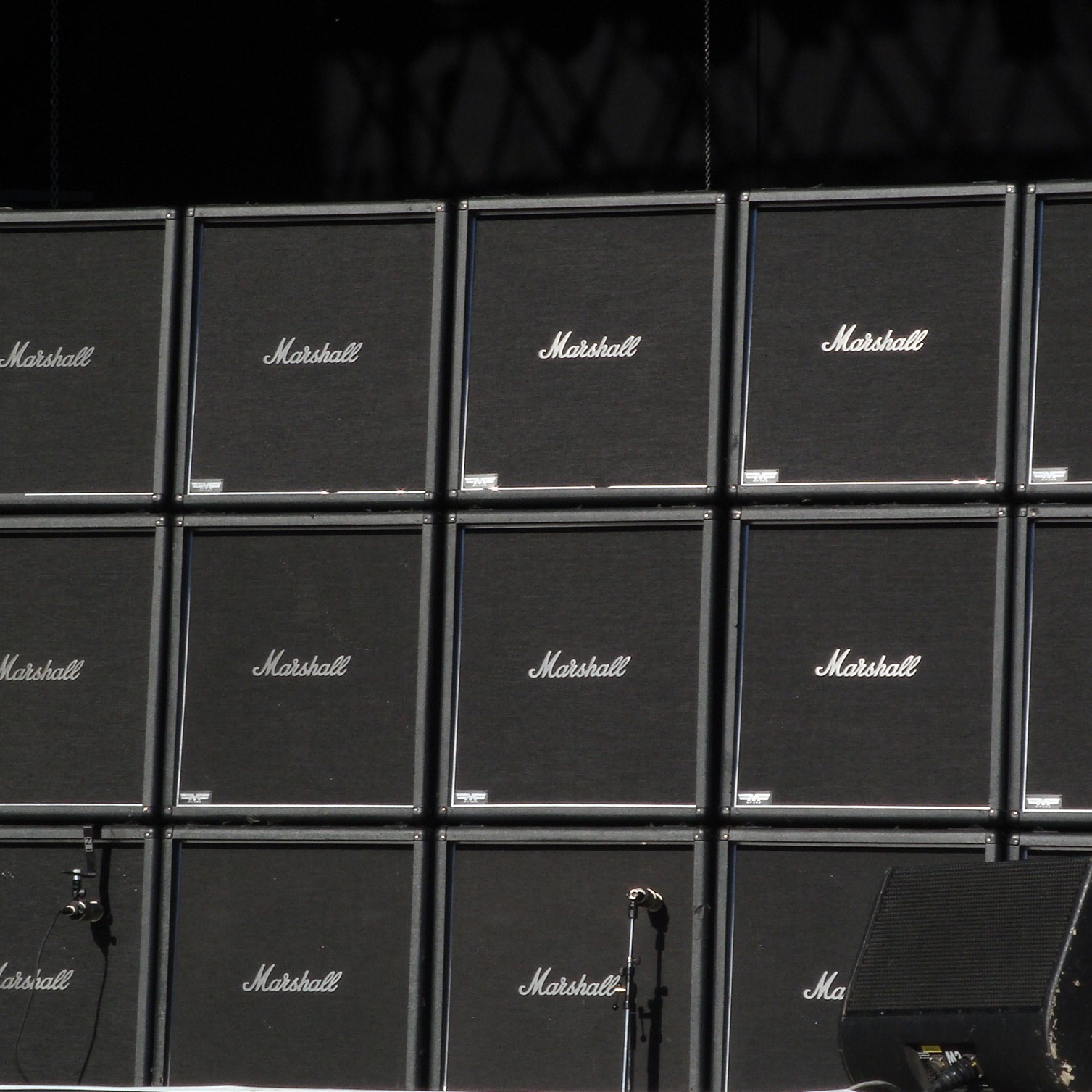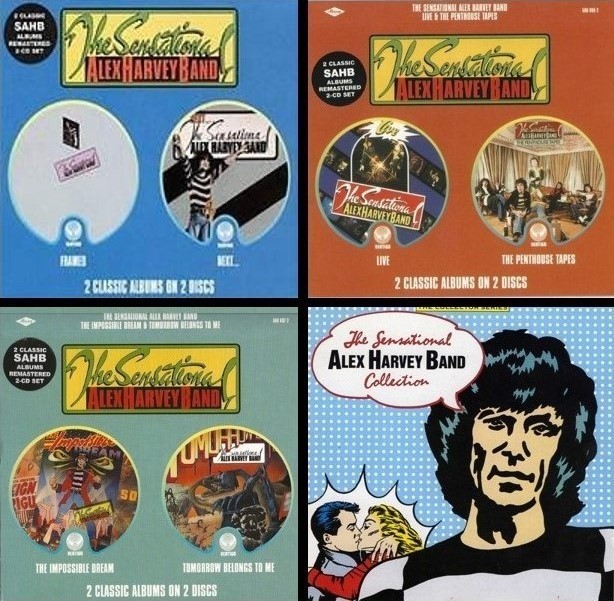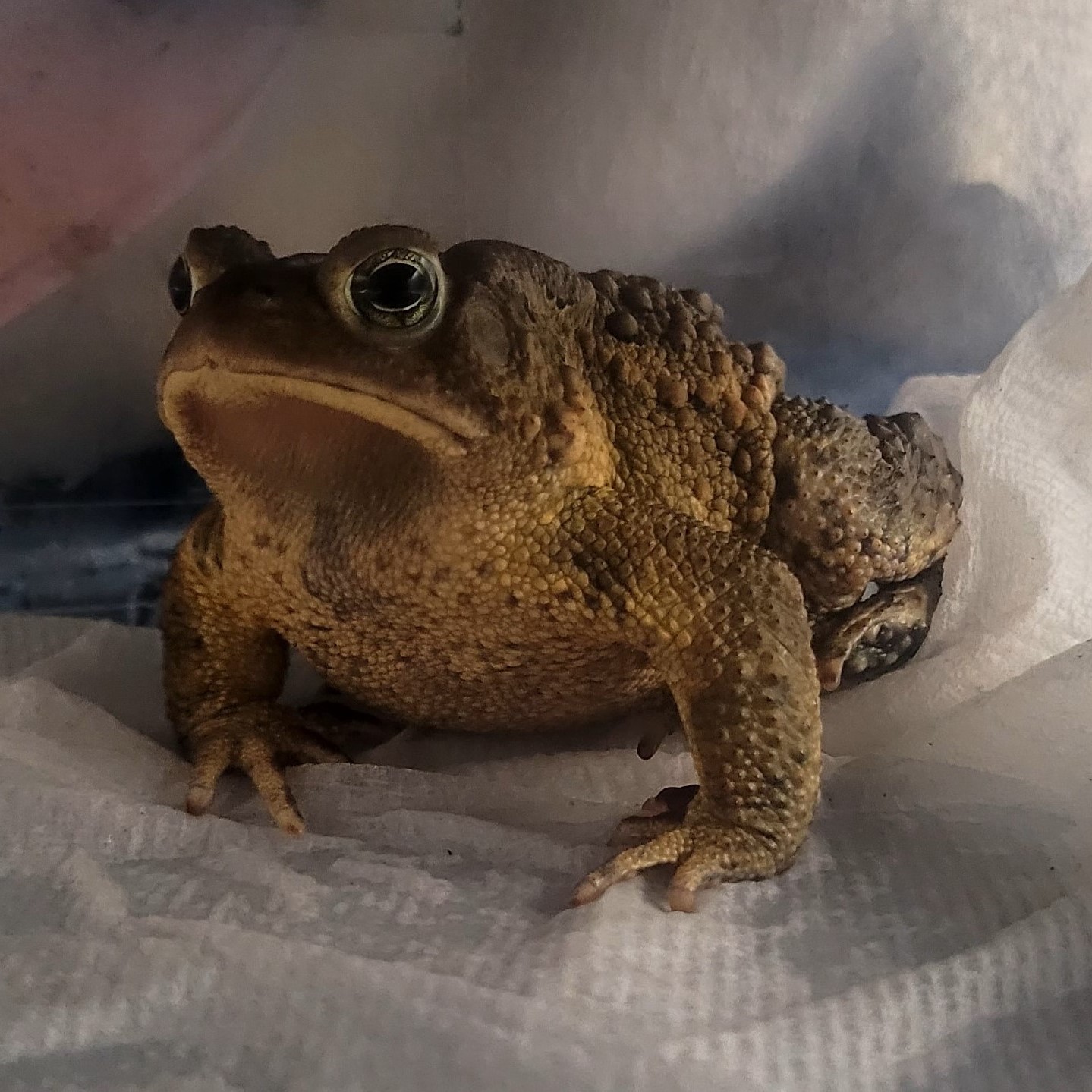 If you think this read is about Phil Spector's "wall of sound", stop reading now. There's nothing for you here. This blog post is about Marshall stacks a.k.a. Marshall walls. Marshall stacks driven by 100 watt heads was the aesthetic ideal during the 1970s. Another aesthetic ideal was a deafening sound that left an indelible imprint. The louder, the better. The size of the Marshall wall became an indicator of status, even when rendered obsolete by improved PA systems. It's a long time since you needed a 6*3 stack to be heard. However, the trade mark and imagery was so strong that later bands put up fake walls of Marshall stacks just for show. Fake, empty or dummy stacks isn't an admirable standard. We can call them "vanity stacks". Back to the "play it loud" ideal. Led Zeppelin were known for playing loud, circa 100 db(A). High volume may cause hearing damage. A volume of 115 dB(A) risks permanent damage after only 30 seconds. The Guinness Book of World Records recognised Deep Purple as the "globe's loudest band" in 1972 for a concert at the London Rainbow Theatre, during which the sound reached 117 dB. The Who later reached painful 126 dB. Playing loud comes at a price. Their guitarist and songwriter Pete Townshend suffered from hearing loss and tinnitus as a result of years of exposure to loud music. The Guinness Book of World Records discontinued the category for fear of encouraging hearing damage. Loudness can be measured by observation or by reputation. To complicate things further, it's hard to measure. Decibel measurement is dependent on distance from the source of the sound; if this is not given, the sound level reported is of limited use. Temporary ringing in the ears is a normal reaction to the kind of extreme noise that causes hearing loss. Back in the days, ringing in the ears was a sign of that you had been to a concert.
If you think this read is about Phil Spector's "wall of sound", stop reading now. There's nothing for you here. This blog post is about Marshall stacks a.k.a. Marshall walls. Marshall stacks driven by 100 watt heads was the aesthetic ideal during the 1970s. Another aesthetic ideal was a deafening sound that left an indelible imprint. The louder, the better. The size of the Marshall wall became an indicator of status, even when rendered obsolete by improved PA systems. It's a long time since you needed a 6*3 stack to be heard. However, the trade mark and imagery was so strong that later bands put up fake walls of Marshall stacks just for show. Fake, empty or dummy stacks isn't an admirable standard. We can call them "vanity stacks". Back to the "play it loud" ideal. Led Zeppelin were known for playing loud, circa 100 db(A). High volume may cause hearing damage. A volume of 115 dB(A) risks permanent damage after only 30 seconds. The Guinness Book of World Records recognised Deep Purple as the "globe's loudest band" in 1972 for a concert at the London Rainbow Theatre, during which the sound reached 117 dB. The Who later reached painful 126 dB. Playing loud comes at a price. Their guitarist and songwriter Pete Townshend suffered from hearing loss and tinnitus as a result of years of exposure to loud music. The Guinness Book of World Records discontinued the category for fear of encouraging hearing damage. Loudness can be measured by observation or by reputation. To complicate things further, it's hard to measure. Decibel measurement is dependent on distance from the source of the sound; if this is not given, the sound level reported is of limited use. Temporary ringing in the ears is a normal reaction to the kind of extreme noise that causes hearing loss. Back in the days, ringing in the ears was a sign of that you had been to a concert.
 In 1990, I ditched all my vinyl records and went all in for cd, which at the time was considered to be "the everlasting format". The market for used cds were emerging and a long process of restoring my record collection had begun. Before the vinyl purge, "Framed", "Next", "The Impossible Dream" and "Tomorrow Belongs To Me" were all records in my collection. One of the first cds I bought was "The Sensational Alex Harvey Band Collection" which was released in 1986 (the repulsive album cover can be seen down to the right in the image). This was out of character. I don't like compilations. And, it didn't make them justice so I quickly got rid of it. Instead, I bought six of their albums in three 2-for-1 sets. This was also out of character. I dont like sets, read more here (opens in a new window). To my defense, no bundle packages. The sets consisted of separate albums with the original artwork included. I played the sets the other day: "Framed", "Next", "The Impossible Dream" and "Tomorrow Belongs To Me" stand out. So many great original songs and clever cover songs. "Hammer Song", "Isobel Goudie", "Boston Tea Party", "Midnight Moses", "Swampsnake", "The Faith Healer", "Next", "Vambo Marble Eye", "The Last of the Teenage Idols", "Tomahawk Kid", "Anthem", "Action Strasse", "Shake That Thing", "Give My Compliments To The Chef", "Tomorrow Belongs to Me", "Delilah" and "The Tale of the Giant Stoneater". The Sensational Alex Harvey Band (SAHB) were a scottish glam rock band formed in Glasgow 1972. Their stage performances incorporated theatrical elements and they wore distinctive stage costumes. Glam rock doesn't age well. This is not a real problem in this case. In my opinion, SAHB were definitely more rock than glam and never became a novelty act. The classic lineup consisted of Alex Harvey (vocals), Zal Cleminson (guitar), Chris Glen (bass), Hugh McKenna (keyboard) and Ted McKenna (drums). Frontfigure Alex Harvey left the group in 1976 and re-joined the group in 1978, and then left again. Relentless touring and the pressure to make money took the best of him. "If you haven't been ripped off, you haven't been in the music business". He struggled with alcoholism, which led to health problems. Alex Harvey died of a heart attack in 1982 waiting for the Zeebrugge ferry (in Belgium) to take him home, the day before his forty-seventh birthday. But the SAHB legacy lives on. "And - underneath a million tons of cold lava a brontasaurus lies wrong way up." Yes, it does. And always will.
In 1990, I ditched all my vinyl records and went all in for cd, which at the time was considered to be "the everlasting format". The market for used cds were emerging and a long process of restoring my record collection had begun. Before the vinyl purge, "Framed", "Next", "The Impossible Dream" and "Tomorrow Belongs To Me" were all records in my collection. One of the first cds I bought was "The Sensational Alex Harvey Band Collection" which was released in 1986 (the repulsive album cover can be seen down to the right in the image). This was out of character. I don't like compilations. And, it didn't make them justice so I quickly got rid of it. Instead, I bought six of their albums in three 2-for-1 sets. This was also out of character. I dont like sets, read more here (opens in a new window). To my defense, no bundle packages. The sets consisted of separate albums with the original artwork included. I played the sets the other day: "Framed", "Next", "The Impossible Dream" and "Tomorrow Belongs To Me" stand out. So many great original songs and clever cover songs. "Hammer Song", "Isobel Goudie", "Boston Tea Party", "Midnight Moses", "Swampsnake", "The Faith Healer", "Next", "Vambo Marble Eye", "The Last of the Teenage Idols", "Tomahawk Kid", "Anthem", "Action Strasse", "Shake That Thing", "Give My Compliments To The Chef", "Tomorrow Belongs to Me", "Delilah" and "The Tale of the Giant Stoneater". The Sensational Alex Harvey Band (SAHB) were a scottish glam rock band formed in Glasgow 1972. Their stage performances incorporated theatrical elements and they wore distinctive stage costumes. Glam rock doesn't age well. This is not a real problem in this case. In my opinion, SAHB were definitely more rock than glam and never became a novelty act. The classic lineup consisted of Alex Harvey (vocals), Zal Cleminson (guitar), Chris Glen (bass), Hugh McKenna (keyboard) and Ted McKenna (drums). Frontfigure Alex Harvey left the group in 1976 and re-joined the group in 1978, and then left again. Relentless touring and the pressure to make money took the best of him. "If you haven't been ripped off, you haven't been in the music business". He struggled with alcoholism, which led to health problems. Alex Harvey died of a heart attack in 1982 waiting for the Zeebrugge ferry (in Belgium) to take him home, the day before his forty-seventh birthday. But the SAHB legacy lives on. "And - underneath a million tons of cold lava a brontasaurus lies wrong way up." Yes, it does. And always will.
 Music journalist Liz Pelly has in her book "Mood Machine: The Rise of Spotify and the Costs of the Perfect Playlist" gone under the hood. It's not a pretty sight. It's scorched-earth tactics taken to an unprecedented level. The book has been described as "the definitive investigation into Spotify, weaving interviews with incisive cultural criticism, and illuminating how streaming has reshaped music for listeners and artists alike." Over a hundred industry insiders, former employees, and musicians have been interviewed. Spotify has transformed music into mood. And this is not very surprising. We live in a world of real time artificial mood-tracking and health monitoring. The silliest job of all must be mood manager. I can't take the job description seriously. Your job is to run around the workplace and create and maintain a happy, positive, and productive atmosphere. Back to the terrible playlists. On the surface, the playlists are seemingly personalized. But, nobody asked you what you like. Instead, the playlists are created through passive algorithm-driven data. The terminal point is moody music without an originator. This has been made possible by users who pay with their money and personal data, and the artists and bands who provide the raw material powering it all. Well, we brought this on ourselves. Actually, there was a time when you sat in the driver's seat. In fact, it was part of the listening experience to choose. Shorter attention span has changed how we listen to music. Not from A to Z as the artist intended, but randomly and abruptly. Maybe I'm old, bitter and technophobic. Nevertheless, I'm perfectly right. I'm not in a good mood. No moody playlist in the world can change that. Death comes as a liberator, eventually. Until then, I suffer. Not in silence - as is proper - but actively, consistently and loudly. To paraphrase the old CCR-hit: "I see the bad mood a-rising. I see trouble on the way. I see earthquakes and lightning. I see bad times today."
Music journalist Liz Pelly has in her book "Mood Machine: The Rise of Spotify and the Costs of the Perfect Playlist" gone under the hood. It's not a pretty sight. It's scorched-earth tactics taken to an unprecedented level. The book has been described as "the definitive investigation into Spotify, weaving interviews with incisive cultural criticism, and illuminating how streaming has reshaped music for listeners and artists alike." Over a hundred industry insiders, former employees, and musicians have been interviewed. Spotify has transformed music into mood. And this is not very surprising. We live in a world of real time artificial mood-tracking and health monitoring. The silliest job of all must be mood manager. I can't take the job description seriously. Your job is to run around the workplace and create and maintain a happy, positive, and productive atmosphere. Back to the terrible playlists. On the surface, the playlists are seemingly personalized. But, nobody asked you what you like. Instead, the playlists are created through passive algorithm-driven data. The terminal point is moody music without an originator. This has been made possible by users who pay with their money and personal data, and the artists and bands who provide the raw material powering it all. Well, we brought this on ourselves. Actually, there was a time when you sat in the driver's seat. In fact, it was part of the listening experience to choose. Shorter attention span has changed how we listen to music. Not from A to Z as the artist intended, but randomly and abruptly. Maybe I'm old, bitter and technophobic. Nevertheless, I'm perfectly right. I'm not in a good mood. No moody playlist in the world can change that. Death comes as a liberator, eventually. Until then, I suffer. Not in silence - as is proper - but actively, consistently and loudly. To paraphrase the old CCR-hit: "I see the bad mood a-rising. I see trouble on the way. I see earthquakes and lightning. I see bad times today."
 I have been running this website for 11 years. I will not go on forever. At some point in an unknown future, I will put the website to rest. I will go down with the ship. I don't have a grandiose personality, but I want to go down in the same magnificent way as the fictive Lord Cutler Beckett in "At World's End". In a dignified way that speaks powerfully and leaves a lasting imprint. Maybe this epic ending is a little bit over the top, after all. I launched the website on March 1, 2014. The first blog entry I posted had the dramatic title "So it begins...". Of course, there was nothing to report at that time. Since then I have posted an anniversary blog post every year. The second blog post (2015) had the expectantly title "So it continues...". Here, I discussed the past, present and future for the site. The third blog post (2016) had the prosaic title "And so it goes on and on and on and on and on...". Here, I did some merciless following up on ambitions and promises. The fourth blog post (2017) had the patronizing title "The necessity of content gardening". Here, I stated that a website, with proper content gardening, could live forever. The fifth blog post (2018) had the technical title "Ratchet effect through organic growth”. Here, I speculated how web indexing and algorithms drove traffic to unprecedented levels. The sixth blog post (2019) had the glorifying title "5 years and 100 000 hits". Here, I rattled off statistics lengthwise and crosswise. The seventh blog post (2020) had the dutiful title "The show must go on". Here, I concluded that the responsibilities I have towards society are too important to be calling it quits. The eight blog post (2021) had the explanatory title "7 is the number following 6 and preceding 8". Here, I complained about muddling through in the time of the pandemic. The ninth blog post (2022) had the cheerful title "Eight is great". Here, I made some random remarks. The tenth blog post (2023) had the rhyming title "Nine is fine". Here, I had nothing to say. The eleventh blog post (2024) had the self-aggrandizing title "Ten years of being insensitive to trends". Here, I ranted about this and that. Today, it's time to summarize the last year in a blog post. The visitor counter indicates 305 076.
I have been running this website for 11 years. I will not go on forever. At some point in an unknown future, I will put the website to rest. I will go down with the ship. I don't have a grandiose personality, but I want to go down in the same magnificent way as the fictive Lord Cutler Beckett in "At World's End". In a dignified way that speaks powerfully and leaves a lasting imprint. Maybe this epic ending is a little bit over the top, after all. I launched the website on March 1, 2014. The first blog entry I posted had the dramatic title "So it begins...". Of course, there was nothing to report at that time. Since then I have posted an anniversary blog post every year. The second blog post (2015) had the expectantly title "So it continues...". Here, I discussed the past, present and future for the site. The third blog post (2016) had the prosaic title "And so it goes on and on and on and on and on...". Here, I did some merciless following up on ambitions and promises. The fourth blog post (2017) had the patronizing title "The necessity of content gardening". Here, I stated that a website, with proper content gardening, could live forever. The fifth blog post (2018) had the technical title "Ratchet effect through organic growth”. Here, I speculated how web indexing and algorithms drove traffic to unprecedented levels. The sixth blog post (2019) had the glorifying title "5 years and 100 000 hits". Here, I rattled off statistics lengthwise and crosswise. The seventh blog post (2020) had the dutiful title "The show must go on". Here, I concluded that the responsibilities I have towards society are too important to be calling it quits. The eight blog post (2021) had the explanatory title "7 is the number following 6 and preceding 8". Here, I complained about muddling through in the time of the pandemic. The ninth blog post (2022) had the cheerful title "Eight is great". Here, I made some random remarks. The tenth blog post (2023) had the rhyming title "Nine is fine". Here, I had nothing to say. The eleventh blog post (2024) had the self-aggrandizing title "Ten years of being insensitive to trends". Here, I ranted about this and that. Today, it's time to summarize the last year in a blog post. The visitor counter indicates 305 076.
Assessment
Executive summary: The website has operated successfully for the last eleven years. New content has been added with regularity and to a sufficient degree without any deterioration in quality. The website is in need of a minor review, primarly with the intent on updating information on existing pages. A plan for this has been developed and implemented. Minor disruptancies in the operation of the website have occured, but this haven't affected production or quality. The coming year we will see a strong focus on content and the management and development of the site.
Visitor statistics
To go from zero to 300 000 visitors took 3 975 days or 10,9 years. The website didn't have many visits in the beginning. Then the web indexing and Google algorithms began to kick in. The average number of days to reach another 10 000 visitors has decreased over time. Despite changes in Google algorithms the website continues to attract visitors The last year has been a record year. More than 43 000 visitors during the last year. All time high.
Department statistics
I wrote one new article last year (Foddershock). This says more about the state of the genre, than about me. As I have stated before, new articles have no intrisic value. I don't want to lower my standards. I have a list of 4-5 bands waiting to be included in my prestigious article series. My aim is to write at least one new article the upcoming year. Moreover, I listed zero new artists in the table. I created zero new lists. I wrote 52 blog entries, which is once a week. However, "blogging is not writing, it's graffiti with punctuation" as someone have pointed out.
Most visited pages
The five pages below are the most visited. The order has shifted over time. The start page (Home) is and have always been the most visited page. Not very surprising. The second page "Artists" is a simple list with links to Discogs and articles. Still, very popular. The third page is the list "10 essential gothic country albums", which comprises a canon of must-have gothic country albums. The "10 best version of Wayfaring Stranger" list has become quite popular in recent years and is placed as number four. Review of "Fossils" (Sons of Perdition collaborative album) is placed as number five. The Sons of Perdition article page belonged to the five most visited pages for many years. It's now placed as number nine.
Flaws
The website has been up and running twenty-four seven. Almost twenty-four seven. On January 7, 2025 my hosting provider closed the site down. Apparently, the website had been hacked and was used to send out spam. The website was down for a whole week. My hosting provider, with the ironic company name Loopia, believes in non-verbal, non-written and telepathic communication. My friend Mikael, site architect and web analysts had to step in and fix the problem, as always. Loopia got the nerve to send me a "Would you recommend the service to others?" e-mail. Provoking, to say the least. I have done some maintance, but still has a few things to fix. If you stumble over any obsolete or incorrect information or any dead links don't hesitate to contact me and I will fix it. I take some pride in that the website is updated.
Reflections
Nothing to report under this section.
Future
I will go on untiringly within the limits of family, work and other duties.
 What we anticipate seldom occurs, but what we least expect generally happens. Take unexpected resurrections, for instance. The Woodbox Gang are putting out their first album since 2012. The album will be released in the spring or summer of 2025. You can preorder the album. For only $20 you will get the new CD shipped to your address and a digital download of the full album (US only). It will also be released on vinyl (not for the perceived sound quality, but for the album cover aesthetics). Unfortunately, at the moment there's no international preorder. The new album will be titled "Brown Cane Toad". According to the frontfigures Hugh DeNeal and Alex Kirt, it's going to be an all-acoustic album including a washboard (upgraded with a paint brush cleaner to achieve a softer sound), dobro, acoustic guitar, upright bass, mandolin and banjo. The frontfigures have declared that they will not try to go down some new route. They will return to where it all started with trashcan Americana and caustic acoustic cacophony. In my opinion, very good and fitting epithets. Why do they want to release an album after all these years? The Woodbox Gang feel that they need to make some new music because there's new things going on in the world. I think the new album will be rough around the edges. Spicy language cannot be ruled out. I want to get a copy of the new album. A lot of time has passed. In March 2025 it's going to be 25 years since the Woodbox Gang played their first show together at the Yellow Moon Cafe in Cobden, IL. In fact, 25 years in the genre is like 100 years in real life.
What we anticipate seldom occurs, but what we least expect generally happens. Take unexpected resurrections, for instance. The Woodbox Gang are putting out their first album since 2012. The album will be released in the spring or summer of 2025. You can preorder the album. For only $20 you will get the new CD shipped to your address and a digital download of the full album (US only). It will also be released on vinyl (not for the perceived sound quality, but for the album cover aesthetics). Unfortunately, at the moment there's no international preorder. The new album will be titled "Brown Cane Toad". According to the frontfigures Hugh DeNeal and Alex Kirt, it's going to be an all-acoustic album including a washboard (upgraded with a paint brush cleaner to achieve a softer sound), dobro, acoustic guitar, upright bass, mandolin and banjo. The frontfigures have declared that they will not try to go down some new route. They will return to where it all started with trashcan Americana and caustic acoustic cacophony. In my opinion, very good and fitting epithets. Why do they want to release an album after all these years? The Woodbox Gang feel that they need to make some new music because there's new things going on in the world. I think the new album will be rough around the edges. Spicy language cannot be ruled out. I want to get a copy of the new album. A lot of time has passed. In March 2025 it's going to be 25 years since the Woodbox Gang played their first show together at the Yellow Moon Cafe in Cobden, IL. In fact, 25 years in the genre is like 100 years in real life.
